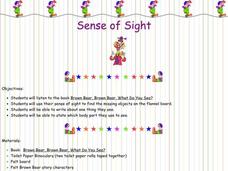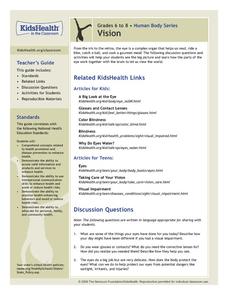Curated OER
What's Inside
Students become more familiar with life science in the context of the scientific method which helps them to become familiar with the various kinds of life science diagrams they may see on a GED science test.
Curated OER
Summer Health Activity: Visiting the Doctor
Students play with dolls to act out feelings about a common experience. In this early childhood lesson plan, students use social, language, and fine motor skills while developing an understanding of their own bodies and the role of an...
Curated OER
Mythical Animals
Students create imaginary animals by assembling pictures of body parts from pictures of real animals. This is one of three linked tasks. The others are "Who's Parts Do I Have?" and "Animals Piece by Piece."
Curated OER
Kirk Medical School
Fifth graders conduct research on the major organ systems of the human body. They create and present 3D models of a body system, and collect basic first-aid supplies for donation to a third-world community.
BBC
Ourselves
Young biologists identify parts of the body, sort humans from other animals, and list the difference they see. Learners are split up into groups of three, and each group must find pictures in magazines of humans and other animals. They...
NOAA
Deep-Sea Benthos
Much like a distant planet, the underwater world of deep-sea benthos is strange and largely unknown. How do creatures survive and thrive in such extreme pressure and temperature conditions? Young oceanographers join the crew of Operation...
Curated OER
Digestion - Part 2
Students read a text on digestion and learn new vocabulary as they read. In this digestion lesson plan, students also complete a picture chart to show the digestive process.
Curated OER
Word Scramble-Body
In this word scramble worksheet, students unscramble words describing parts of the human body and write each beneath its picture.
Curated OER
IDENTIFYING PARTS OF THE BODY
Students identify and describe the various parts of the body therefore, practicing English vocabulary, pronunciation, and spelling. They discuss the various body parts, some of the inner organs and also, their functions. Finally,...
Curated OER
Whose Parts Do I Have? (Wings and Things)
Students identify an animal and a body part and then matches a body part to a specific animal. This will assess their ability to sort organisms and objects into groups according to their parts and describe how the groups are formed and...
Curated OER
Parts of the Body
In this ESL parts of the body learning exercise, students analyze 7 pictures that depict parts of the body. Students match the pictures to the nouns that describe them.
Curated OER
Parts of the Body Word and Picture Matching
In this parts of the body worksheet, students examine 7 pictures of parts of the body. Students match these with the words that describe them.
Curated OER
Parts of the Body
In this parts of the body picture and word match worksheet, students examine 5 pictures that depict parts of the body. Students match these with the words that describe them.
Curated OER
Animal Parts
In this animal body parts worksheet, learners play a matching game where they match 16 different animal part cards with the corresponding animals provided on a list. Picture and word cards are provided. Directions for introducing the...
Curated OER
Where Does the Blood Go?
Students investigate where the blood in our hearts travels by observing a diagram in class. In this cardiovascular lesson, students examine their own heart by checking their pulse in class. Students investigate a human body diagram and...
Curated OER
Where Does Food Go?
Students understand how their food moves through the digestive system. In this digestion instructional activity, students measure the length of the digestive system from a projection of it. Students draw their own pictures of the...
Messenger Education
Exploring Exploring
The reason people first began trading was because of their desires for objects other societies possessed. In the activity, classes discuss why exploration has been a common thread in all societies and where these desires have taken...
University of Minnesota
Dendritic Spines Lab
This is your brain on drugs ... literally! Your neuroscientists-in-training examine the evidence of drug use on the human brain and how neurons change their connectivity when altered by drugs. They then work together to create testing...
Curated OER
Bones, Bones, and More Bones
Students describe the functions of bones in the human body. They describe the make up of a bone. They engage in a series of wonderful hands-on activitiies that reinforce learning of bones and the skeletal system.
Curated OER
Fish Fashion 101
Students explore fish anatomy. In this fish anatomy and adaptation instructional activity, students define and identify the location of fish body parts. Students add these parts of a fish's anatomy to a life-sized fish costume worn by a...
Curated OER
Sense of Hearing
Students explore the sense of hearing. In this human biology lesson, students listen to the story Polar Bear, Polar Bear, What Do You Hear? and give examples of how they use their sense of hearing everyday. Students pass around plastic...
Curated OER
Sense of Sight
Learners examine the sense of sight. In this human biology lesson, students read the book Brown Bear, Brown Bear, What Do You See? and discuss all of the animals seen in the story. Learners use binoculars and take several digital photos...
Nemours KidsHealth
Vision
From the iris and retina to glasses and contact lenses, learners will be excited to see what activities are in store for them as they learn about the complex organ of the human eye.
University of Arizona
The Leg Bone Is Connected to The...
Students discover the names of 13 major bones in the human skeletal system. They construct their skeleton using paper plates and other simple products. Links to templates are provided within the resource.

























